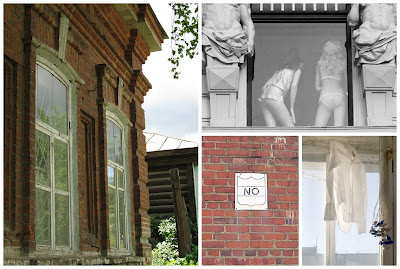 Anger feeds upon anger. We all know this, as well as that we're capable of breaking the cycle of anger at any time, but we rarely put this knowledge into practice.
Anger feeds upon anger. We all know this, as well as that we're capable of breaking the cycle of anger at any time, but we rarely put this knowledge into practice.Today, I was angry at a FedEx deliveryman. When I got home from work yesterday, there was a tag hanging from my front door stating that FedEx had been by, but missed me. They'll be back tomorrow the tag informed me, and if I weren't home, all I had to do was sign below and leave the tag on the door and they'd leave the package on my doorstep.
I had been expecting the package. It's part of the settlement agreement from my former employer - one of five payouts for my former stock, each totalling over $20,000. It was not a package I wanted to miss.
As luck would have it, I hadn't been planning to go to the office today. I had to give a presentation to the Atlanta City Council on citizens' participation in the BeltLine project, and since I had to be downtown at City Hall mid-day, I decided not to drive out to my suburban office and essentially spend much of the day traveling up and down the Interstate. I had brought my laptop home with me prepared to work from the house, so it would be no problem at all to wait around for delivery of the check.
I put on a pot of coffee in the morning and worked until I had to leave for City Hall, but the delivery man hadn't shown up. I left the signed tag on my doorstep as instructed when I left, and when I got back home around 2:30, it was still there. I tracked the package on line, and learned that it was still on the truck, scheduled for delivery by 3:00 pm.
When no one showed up by 3, I checked the web again, but this time the system couldn't identify my tracking number. So I called FedEx and was told that the deliveryman had stopped by but no one was home. That didn't make sense because I had left the signed tag on the door and if he had been by he would have seen it and left my package. The person on the phone apologized, and told me that they will re-direct the delivery and have it to me by 5:00.
Five o'clock - no sign of Fed Ex. I called again and after being put on hold for an inordinate amount of time, was told that they hadn't been able to get hold of the deliveryman because he apparently doesn't carry a cell phone (they rely on their deliveryman's own personal cell phones to contact them?), and that they could either deliver the package tomorrow or I could pick it up at their station tonight.
I don't believe that the deliveryman had ever stopped by even though their records state that he had but no one was home (why hadn't he seen the signed door tag, then?), so I had no confidence in him coming by tomorrow and certainly didn't want my check to be returned to sender after a third failed attempt at delivery. So I had to drive out to their station to pick it up - a 40-mile round trip during the height of rush hour through some of the worst traffic in Atlanta.
I was angry, and took some of that anger out on the poor FedEx employee on the telephone. I was angry at what I imagined to be a lazy deliveryman, who would rather falsely claim that no one was home than bother to actually come by. I was angry that they had no way to get hold of him while he was out on his route. I was angry at the lack of consideration from the person on the phone. I was angry about the remote location of the FedEx station. I was angry about Atlanta's gridlocked traffic.
In fact, the angrier I got, the more things it seemed that there were to be angry about. I was angry about the heat. I was angry about driving to the west and into the evening sun. I was angry about the way the moron in front of me was driving. I couldn't wait to get to the Fed Ex office and air all of my complaints about their so-called "service," and while I was at it, I decided, I would file a complaint about the deliveryman, too.
But as I finally pulled up to the office, I had a moment of clarity - I was about to participate in an unpleasant confrontation, but the only reason it had to be that way was because I had decided that it shall be so. I'm sure the girl at the counter wasn't standing there thinking, "Wouldn't it be great if an irate middle-aged man walked in right about now?" I was about to get my check, and it was up to me to decide whether it was going to be a pleasant or an unpleasant experience.
I forced a smile and walked in. Handing the girl at the counter my tag, she smiled back and headed off to get my package. The interesting thing here was that although my smile was forced at first, soon I felt a genuine gratitude to myself for choosing not to go the anger bear route, and that gratitude, in turn, made my forced happiness real. When the girl returned with my package I thanked her and headed home, driving in open lanes against the traffic, with the evening sun back over my shoulder.
We all know that we have the means to control our emotions, but we so rarely exercise those controls. The world may be cruel and indifferent and lazy if we choose to look at it like that, or we can choose to rise above the perceived cruelty, indifference and laziness and be thankful for the check in our pocket (or whatever else we choose to be happy about). We can be thankful for the mindfulness and practice that allows us to see ourselves in these situations, and for the wisdom to realize that the anger is created in our minds, not in the circumstances.
And we can feel gratitude for giving ourselves the gift of cooperation rather than the punishment of discord.

















































